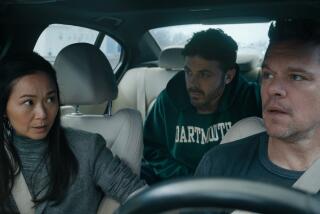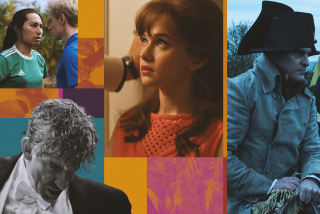Peasants Are âInheritorsâ of Land, Lifeâs Changes
Stefan Ruzowitzkyâs âThe Inheritorsâ is a tragedy of caste, rich in pathos as well as humor. Itâs an impassioned yet disciplined film in which the fullness of life is expressed with such subtlety and lyricism that you may not catch all its meanings and insights on just one viewing. By any measure, itâs one of the most accomplished and rewarding films of the year.
The year is around 1930, but take away electricity and it could be centuries earlier. Time seems to have stood still in the ravishingly beautiful Austrian countryside where the film is set.
And thatâs just how the regionâs rich farmers want to keep it. One of their kind, named Hillinger, has been murdered and he has done the unthinkable--he has written an outrageously frank will, telling one and all what he thinks of them and leaving everything to his 10 peasants. To put it mildly, this news does not sit well with the rural communityâs ruling class; its dominant figure, Danninger (Ulrich Wildgruber), is absolutely apoplectic.
No less shocked are the peasants themselves. The peasants have defied their brutal foreman (Tilo Pruckner), who without their permission has told Danninger that the group would sell the farm to him at a price well below its actual value. The foreman leaves in a fury with two followers. The seven remaining new landowners will ultimately be required to buy these other three out.
*
Not surprisingly, shock gives way to euphoria. Old Nane (Julia Gschnitzer) dares to think she might indulge herself and buy her first-ever umbrella; Emmy (Sophie Rois) can now bring her young son, born out of wedlock, to live with her; and Lukas (Simon Schwarz), known in the community as the Foundling, brings Hillingerâs Gramophone to the stable, flooding the place with Carusoâs robust âLa Donna e Mobile,â which he confidently announces is being sung âin American.â
Brought to the farm by Old Nane as a foundling some 20 years earlier, Lukas has been kept illiterate by Hillinger. The hard-working Lukas is not stupid, but he is naive. Blond and handsome, he is a happy-go-lucky playboy. By contrast, Emmy, his sometime lover, is a strong and smart woman, a proto-feminist who from the get-go tells herself that their little group canât afford to make mistakes.
The seven are scarcely a formidable group: They are Severin (Lars Rudolph), the filmâs narrator, an outsider, a slight, secretly gay man attracted to Lukas; two ineffectual young girls; and a stable boy. Against great odds, they do pull together making the farm more productive than ever. Success, even modest, only makes their position in the community more vulnerable, and it is not surprising that Danninger finds this turn of events increasingly intolerable.
As âThe Inheritorsâ grows darker it grows more complex, with the unraveling of the circumstances of Hillingerâs murder combining with the increasing fragility of the former peasantsâ situation to reveal the evils of the class system at its cruelest, most exploitative and most hypocritical.
Meanwhile, the local priest seems to keep himself above the fray. That this is a society ripe for the Nazism so soon to sweep over it seems utterly inescapable. Yet there is another layer, a history of tangled relationships that wonât be revealed here, that gives âThe Inheritorsâ a personal dimension so essential to yielding its ultimately tragic effect.
Evocative, ribald, painful, compassionate and perceptive, âThe Inheritorsâ is a beautiful, stylish film and an uncommonly satisfying and stirring experience.
* MPAA rating: R, for strong language and violence. Times guidelines: It includes much profanity and graphic violence.
âThe Inheritorsâ
Simon Schwarz: Lukas
Sophie Rois: Emmy
Lars Rudolph: Severin
Julia Gschnitzer: Old Nane
Ulrich Wildgruber: Danninger
A Stratosphere Entertainment presentation of a Dor Production with ORF and Bayerischer Rundfunk. Writer-director Stefan Ruzowitzky. Producers Danny Krausz,, Kurt Stocker. Cinematographer Peter von Haller. Editor Britta Burkert-Nahler. Costumes Nicole Fischnaller. Music Erik Satieâs Piano Compositions, interpreted by Christian Heitler. Art director Isi Wimmer. In German, with English subtitles. Running time: 1 hour, 35 minutes.
* At selected theaters throughout Southern California.
More to Read
Only good movies
Get the Indie Focus newsletter, Mark Olsen's weekly guide to the world of cinema.
You may occasionally receive promotional content from the Los Angeles Times.










